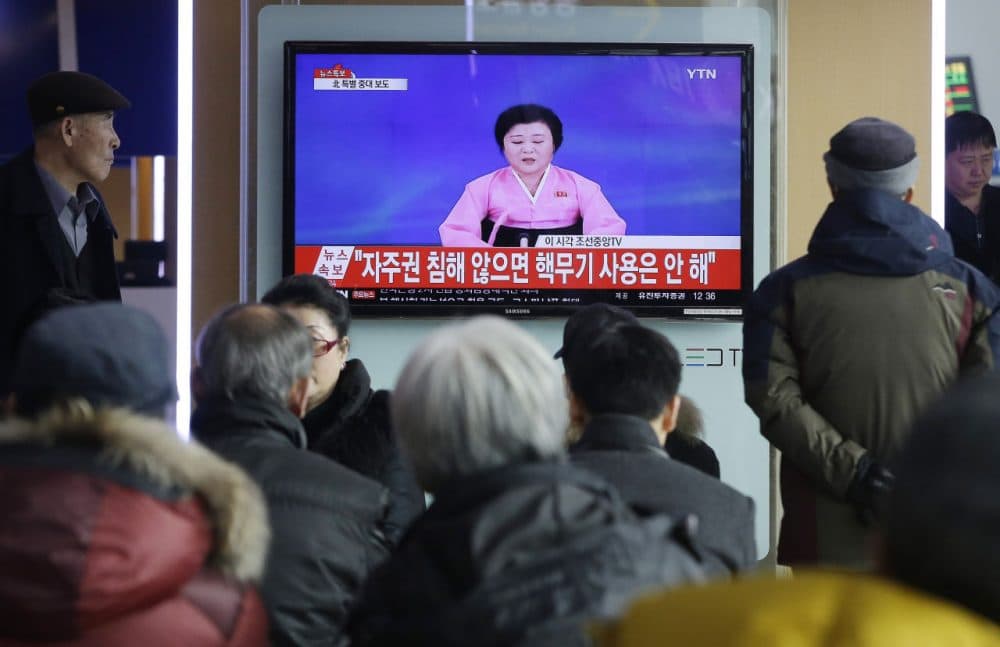Advertisement
North Korea Says It Has Conducted H-Bomb Test
Resume
Soon after the ground shook around its nuclear testing facility, North Korea trumpeted its first hydrogen bomb test - a powerful, self-proclaimed "H-bomb of justice" that would mark a major and unanticipated advance for its still-limited nuclear arsenal.
Pyongyang's announcement Wednesday was met with widespread skepticism, but whatever the North detonated in its fourth nuclear test, another round of tough international sanctions looms for the defiant, impoverished country.
The test likely pushed Pyongyang's scientists and engineers closer to their goal of building a warhead small enough to place on a missile that can reach the U.S. mainland. But South Korea's spy agency thought the estimated explosive yield from the explosion was much smaller than what even a failed H-bomb detonation would produce.
The test was met with a burst of jubilation and pride in Pyongyang. A North Korean television anchor, reading a typically propaganda-heavy statement, said a test of a "miniaturized" hydrogen bomb had been a "perfect success" that elevated the country's "nuclear might to the next level."
A large crowd celebrated in front of Pyongyang's main train station as the announcement was read on a big video screen, with people taking videos or photos of the screen on their mobile phones and applauding and cheering.
North Korea's state media stood firm in saying the test was a self-defense measure against a potential U.S. attack. "The (country's) access to H-bomb of justice, standing against the U.S., the chieftain of aggression ..., is the legitimate right of a sovereign state for self-defense and a very just step no one can slander."
In Seoul and elsewhere there was high-level worry. South Korean President Park Geun-hye ordered her military to bolster its combined defense posture with U.S. forces. She called the test a "grave provocation" and "an act that threatens our lives and future." Japanese Prime Minister Shinzo Abe said, "We absolutely cannot allow this."
Washington and nuclear experts have been skeptical about past North Korean claims about H-bombs, which are much more powerful and much more difficult to make than atomic bombs. A confirmed test would further worsen already abysmal relations between Pyongyang and its neighbors and lead to a strong push for tougher sanctions on North Korea at the United Nations. The Security Council was holding an emergency meeting.
Britain's ambassador to the United Nations, Matthew Rycroft, says the meeting will aim to agree on a statement condemning the nuclear test and will follow up with a new resolution expanding sanctions against North Korea. He told reporters, "the Security Council needs to be clear in its condemnation and robust in its response."
A successful H-bomb test would be a big advance in North Korea's nuclear weapons program. Fusion is the main principle behind the hydrogen bomb, which can be hundreds of times more powerful than atomic bombs that use fission. In a hydrogen bomb, radiation from a nuclear fission explosion sets off a fusion reaction responsible for a powerful blast and radioactivity.
A South Korean lawmaker said the country's spy agency told him in a private briefing that Pyongyang may not have conducted an H-bomb test given the relatively small size of the seismic wave reported.
Guest
- Christopher Hill, dean of the Josef Korbel School of International Studies at the University of Denver. He served as Assistant Secretary of State for East Asian and Pacific Affairs from 2005 until 2009 during which he was also the head of the U.S. delegation to the Six Party Talks on the North Korean nuclear issue. He has also served as ambassador to South Korea, Iraq, Poland and Macedonia. He tweets @ambchrishill.
This segment aired on January 6, 2016.